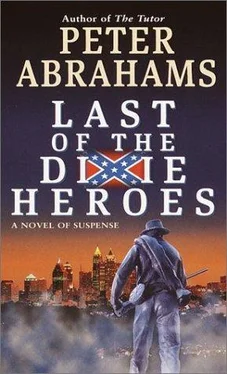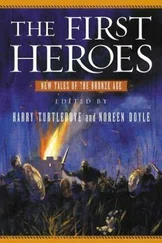Peter Abrahams - Last of the Dixie Heroes
Здесь есть возможность читать онлайн «Peter Abrahams - Last of the Dixie Heroes» весь текст электронной книги совершенно бесплатно (целиком полную версию без сокращений). В некоторых случаях можно слушать аудио, скачать через торрент в формате fb2 и присутствует краткое содержание. Жанр: Триллер, на английском языке. Описание произведения, (предисловие) а так же отзывы посетителей доступны на портале библиотеки ЛибКат.
- Название:Last of the Dixie Heroes
- Автор:
- Жанр:
- Год:неизвестен
- ISBN:нет данных
- Рейтинг книги:4 / 5. Голосов: 1
-
Избранное:Добавить в избранное
- Отзывы:
-
Ваша оценка:
- 80
- 1
- 2
- 3
- 4
- 5
Last of the Dixie Heroes: краткое содержание, описание и аннотация
Предлагаем к чтению аннотацию, описание, краткое содержание или предисловие (зависит от того, что написал сам автор книги «Last of the Dixie Heroes»). Если вы не нашли необходимую информацию о книге — напишите в комментариях, мы постараемся отыскать её.
Last of the Dixie Heroes — читать онлайн бесплатно полную книгу (весь текст) целиком
Ниже представлен текст книги, разбитый по страницам. Система сохранения места последней прочитанной страницы, позволяет с удобством читать онлайн бесплатно книгу «Last of the Dixie Heroes», без необходимости каждый раз заново искать на чём Вы остановились. Поставьте закладку, и сможете в любой момент перейти на страницу, на которой закончили чтение.
Интервал:
Закладка:
Roy checked the bottom of the right-hand page, saw office chairs: the Cremona, the Portman, the Benchley. He looked up at Curtis.
“Any of them strike your fancy?” Curtis said.
“I-”
“Because you get to choose your own chair, Roy, one of the perks of the new job.”
No air. Roy’s hand was in his pocket, squeezing the inhaler.
“Roy?”
“I want this job, Curtis, I can’t tell you how bad, but-”
Curtis frowned. It made him look much younger, made it easy to picture him as a boy. “What I said yesterday-sometimes I wonder if you’re even interested-is that what’s bothering you?”
“No, I-”
“Because it was ill considered. I apologize. I’ll tell you what I told Bill Pegram-you’re a nice guy, Roy, and sometimes people mistake niceness for a lack of ambition.” He paused to let that sink in, just the way preachers did when they came to a main point; a pause that went on and on, at least in Roy’s mind. “We straight on this now?” Curtis said.
“I’ve got to leave, Curtis, this minute.” An explosive little sentence that left Roy breathless.
“I beg your pardon?”
Roy fought for air. “My kid. I don’t know what’s happening. This is a temporary… things are actually looking… in a little while, everything’ll be… but-”
Curtis sat back in his chair. Roy had a sudden moment of clarity: it was the Portman, he could tell from the little brass things on the leather arms.
“Another problem with your son?” Curtis said.
The complicated explanation Roy had been working on, the one with an optimistic promise at the end, got bottled up in his struggling throat. He nodded.
“We’re off to an unusual kind of start here, aren’t we, Roy?”
Roy nodded again.
“Why don’t you take the rest of the day,” Curtis said.
Roy turned to go.
“With someone covering, of course.”
It was just like the last time, except now Rhett had a split lip instead of a black eye. “What’s going on?” Roy said, hurrying across the nurse’s office. “I thought you said he wasn’t hurt.”
“It’s not as bad as it looks,” said Ms. Steinwasser, “is it, Tanisha?”
“Not so bad, no,” said the nurse, lowering an ice pack to Rhett’s mouth. Rhett batted it away, a violent little act that Roy didn’t like at all.
Roy knelt in front of him. “What happened to you?”
Rhett wouldn’t meet Roy’s eye, hung his head. The motion brought a quivering drop of blood to the edge of his lip.
Roy, still on one knee, turned to Ms. Steinwasser. “What the hell happened here?”
“Language,” she said, “please.”
Roy stood up.
“Your son,” said Ms. Steinwasser, backing half a step, “threatened to shoot another student.”
“I don’t believe it.”
“Nevertheless.”
“Shoot him with what, for Christ sake?”
“I asked you nicely.”
“Shoot him with what?”
“We’ll get to that,” said Ms. Steinwasser. “The fact that he had ammunition gave us every reason to take the threat seriously.”
“Ammunition?” Roy said.
“Which he says you gave him.”
“Never.”
“He got it from somewhere.”
“Got what? I don’t know what you’re talking about.”
“This,” said Ms. Steinwasser, holding up a whitish thing Roy thought was some sort of thimble at first, and then recognized: Gordo’s Kennesaw Mountain bullet. What was there to fear from spent bullets?
“That’s it?” Roy said. “That’s what this is about? A souvenir?”
“Souvenir?”
“A relic,” Roy said. “Spent. Harmless.”
“I don’t know about the harmless part,” said Ms. Steinwasser, opening the door to an adjoining room. Another boy, the big, broad-faced boy-Cody, Roy remembered-was sitting on an examining table, holding a bandage over a cut on the side of his nose, or possibly the inner corner of his eye. She closed the door.
“But you’d need a musket,” Roy said, “an antique, and there’s no-”
Rhett looked up. “I threw it at him,” he said. He sounded fierce and defiant. The drop of blood rolled down his chin; another took its place in the split of his lip.
“You threw it at him?” Roy said.
“He said I didn’t have a real Civil War bullet, and even if I did it was geeky, and I threw it at him.”
“This was after he hit you in the mouth?”
Rhett shook his head.
“Your son was the initiator,” Ms. Steinwasser said.
“I thought that wasn’t supposed to matter,” Roy said. “And there’s still nothing about a gun or anything like that.”
“I told him I’d shoot him,” Rhett said.
“With what?”
“He picks on me all the time.”
“But shoot him with what?”
“He rubs my face in it.”
“Shoot him with what?”
“I made up the gun part.”
Roy faced Ms. Steinwasser, ready to make his argument about the nonexistence of a weapon.
Then Rhett added, “Lucky for him.”
Roy just stood there.
“Have you read the parents handbook, Mr. Hill?” said Ms. Steinwasser.
“Parents handbook?”
“A copy is sent home with every student. The policy is very clear. No weapons of any kind. No knives. No guns.” She held up the oxidized bullet. “No ammunition.”
“But-”
“Must we bring the police into this?”
Rhett got a one-week suspension. Roy drove him to Marcia’s in silence. Rhett took out his key, unlocked the door. No one home. Roy got some ice cubes, wrapped them in a dish towel. “Here.”
They sat at the card table, much like the one at his father’s, but clean. The piles-dirt in the backyard, mail on the table-had grown. Rhett held the dish towel to his lip, gazed at nothing. Roy watched him.
“You could have put his eye out,” he said.
“You’re just like all the others,” Rhett said. “Taking his side.”
“I’m not taking his side. You could have put his eye out.”
“Good.”
Roy made a decision, made it, he realized, on the basis of his vision, on how he saw the future, the way Carol said to do it: he would ask Marcia to move back in right away. Rhett could then return to his old school, never face the other boy again, get back on track. What better time? She’d understand.
“When’s your ma coming home?”
“Who gives a shit?”
Roy laid his hand on the table. “Don’t you speak like that about your mother.”
Rhett muttered something into the dish towel.
“What was that?” Roy said. He reached across the table, pulled the towel away, not roughly, but he pulled it away. “What was that?”
“Those stupid lips of hers,” Rhett said, almost inaudible.
“What do you mean?”
“Nothing.”
“I don’t understand.”
Rhett looked up, met Roy’s eye; yes, fierce, defiant. This was new. Roy had no idea how to handle it.
“You can go,” Rhett said.
“I’m staying.”
They sat. The bleeding stopped. Rhett left the room and didn’t come back.
Roy heard a car, went to the front door, looked out: not Marcia in a taxi, but Barry in his Benz with the BARRY plate. Roy took out the inhaler, sprayed it down his throat.
ELEVEN
Barry came into the kitchen.
”Moving in?” he said.
”You know why I’m here,” Roy said, standing by the table, wishing some sarcastic put-down had come to mind.
Barry dropped his briefcase, loosened his tie, shrugged off his suit jacket-there were sweat stains under both arms of his striped shirt-and hung it on a chair. “Bail the kid out already?”
“His name is Rhett.”
“Super,” said Barry, opening the fridge. Roy saw what he’d seen before-Absolut, yogurt, lemons-plus a few cartons of Chinese food. Barry removed one, sat at the table, began eating from it-round balls, possibly chicken, in a congealed orange sauce-with chopsticks. His soft, pudgy fingers handled the chopsticks with a skill that took Roy by surprise; he himself had tried chopsticks once or twice, out on a date in high school or college, but never actually learned to use them. Barry steered several of the little balls quickly into his mouth, suddenly looked up.
Читать дальшеИнтервал:
Закладка:
Похожие книги на «Last of the Dixie Heroes»
Представляем Вашему вниманию похожие книги на «Last of the Dixie Heroes» списком для выбора. Мы отобрали схожую по названию и смыслу литературу в надежде предоставить читателям больше вариантов отыскать новые, интересные, ещё непрочитанные произведения.
Обсуждение, отзывы о книге «Last of the Dixie Heroes» и просто собственные мнения читателей. Оставьте ваши комментарии, напишите, что Вы думаете о произведении, его смысле или главных героях. Укажите что конкретно понравилось, а что нет, и почему Вы так считаете.












